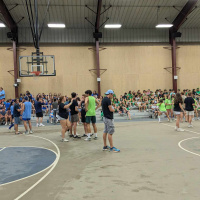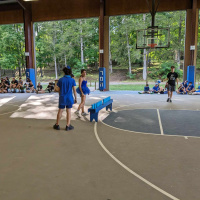Synopsis
Broadcasting from Camp Ramah in the Berkshires. We are the soundtrack for each summer! Our air is filled with shows produced by and for the campers!LISTEN LIVE: http://KolRamah.us
Episodes
-
Yom Sport Closing Tekes 2024
05/08/2024 Duration: 27minThe two teams of Yom Sport present songs, cheers, and their banners. Congratulations to the blue team!!! Recorded by Amy Erlanger
-
Yom Sport 2024- B Side Competes!
05/08/2024 Duration: 20minA snippet of the B Side Competition that was part of Yom Sport 2024.
-
Yom Sport 2024- Nitzanim Writes Cheers!
05/08/2024 Duration: 04minThe kids of Nitzanim create cheers for their respective teams.
-
Yom Sport 2024- Cochavim Competes!
04/08/2024 Duration: 25minThe kids of Cochavim compete during Yom Sport! It's Blue vs Green. Who's going to come out with the victory?
-
Yom Sport Breakout 2024!!!!! Recorded August 3, 2024
04/08/2024 Duration: 17minThe kids of Camp Ramah in the Berkshires find out that Yom Sport is happening the next day, and that the theme is Monsters Inc.!
-
-
JV Parsha- Episode 5- Matot Masei
02/08/2024 Duration: 28minJacki Honig and Alex Friedman put the Chug back in "Chugmash" One last time this summer with Parshat Matot Masei.
-
Parsha Talk Matot Masei 2024 5784
02/08/2024 Duration: 36minParsha Talk with Rabbis Eliot Malomet, Jeremy Kalmanofsku and Barry Chesler. Parashat Mattot-Mas’ai [Numbers 30:2-36:13], the double parashah which concludes the Book of Numbers, is the longest parashah in the Torah by the number of sentences and word. Because it is a double parashah it has, perhaps, a larger number of themes than usual. We spent most of our time discussing the curious request of the tribes of Reuven, Gad and half Menashe, who ask Moshe if they can stake their claim on the east side of the River Jordan, rather than in the land to its west. What does this say about the Zionist enterprise, if already at the beginning, part of the people chose to stay in the Diaspora? Feel free to leave comments below or at parshatalk@gmail.com. The conclusion of another book of the Torah in the annual synagogue reading, reminds us that people have been held hostage since we began the annual reading last Simchat Torah, October 7th in Israel. May the hostages be speedily returned to their homes; may the sold
-
Kol Ramah talks Jewish Identity
02/08/2024 Duration: 05minAmy Erlanger and Jamie Cosky interview campers about what being Jewish means to them.
-
-
Are You Smarter Than a Tzeirim-er?
30/07/2024 Duration: 39minThe kids of Tzeirim put the Kol Ramah hosts, Amy and Jamie, to the test.
-
JV Parsha- Episode 4- Pinchas
26/07/2024 Duration: 25minJacki Honig and Alex Friedman return to discuss Pinchas and women running the world.
-
Parsha Talk Pinchas 5784 2024
25/07/2024 Duration: 38minParsha Talk with Rabbis Eliot Malomet, Barry Chesler and Jeremy Kalmanofsky. Parashat Pinchas [Numbers 25:10–30:1] begins with the end of the story from the last nine verses of last week’s parashah. Pinchas is apparently rewarded by God with a b’rit shalom [covenant of peace]. because he stilled God’s kin‘ah [translated as zealousness or jealousy]. We spent most of our conversation trying to understand this enigmatic story, and how the story of Pinchas relates to other stories we know from the Bible. Because our conversation took place on Wednesday, the day after th Fast of the 17th of Tammuz, which begins the 3-week period of mourning culminating with Tisha B’av [the Fast of the 9th of Av, coinciding withAugust 13], we also discussed the special haftarah from the 1st chapter of Jeremiah [more precisely, Jeremiah 1:1–2:3]. Please leave comments or criticisms below, or e-mail us at parshatalk@gmail.com. We continue to be mindful of the hostage and their families, and the men and women who defend Israel as
-
B13 Reacts to Video Guessing Games
24/07/2024 Duration: 39minB13 Reacts to Video Guessing Games by Camp Ramah in the Berkshires
-
Parsha Talk Balak 5784 2024
19/07/2024 Duration: 41minParsha Talk with Rabbis Eliot Malomet, BArry Chesler and Jeremy Kalmanofsky. Parashat Balak [Numbers 22:2–25:9] follows closely on the events of last week. Balak, king of Moab, feels threatened by the approaching Israelites, and seeks help from Balaam, a prophet who lives in the wider neighborhood. Long before Mr. Ed featured a talking horse on TV, the Bible had its own story about a talking donkey, who rebukes Balaam for beating him when his path is blocked by an angel. Balaam finally arrives in the vicinity of the Israelite encampment where he proceeds to bless the people Israel several times, rather than curse them as he had been commissioned to do. The parashah concludes with half the account of the curious incident at Baal Pe’or, where the Israelites become involved in questionable behavior with Midianite women. Please leave and comments or criticisms below, or e-mail us at parshatalk@gmail.com. We continue to be mindful of the hostage and their families, and the men and women who defend Israel as s
-
Solelim Musical 2024: The Little Mermaid
19/07/2024 Duration: 58minAdat HaSolelim puts on a production of The Little Mermaid.
-
A10 Interviews- Recorded July 15, 2024
18/07/2024 Duration: 28minA10 Interviews- Recorded July 15, 2024 by Camp Ramah in the Berkshires
-
An Original Play By Cochavim: The Legend Of The Cave
18/07/2024 Duration: 11minWith the assistance of Landon Braverman, here is an original play by Cochavim.
-
An Original Play by Tzeirim: What Are We Gonna Do About Our Boy?
18/07/2024 Duration: 12minWith the assistance of Landon Braverman, the kids of Tzeirim wrote an original play about the importance of traditions and friendship.
-
Shorashim Talks Sports- Recorded on July 15, 2024
16/07/2024 Duration: 28minThe kids of Shorashim do sports commentary with Jamie Cosky. Amy Erlanger is educated on sports during this whole thing.

































